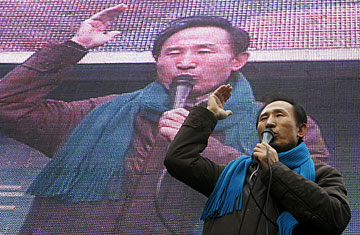
Opposition candidate Lee Myung Bak speaks to supporters in Seoul, South Korea, on Dec. 3
South Korea's leading presidential candidate, Lee Myung Bak, averted a setback that could have cost him the upcoming election when government prosecutors cleared him of fraud accusations in connection with a 2001 financial scam involving a former business partner.
The Seoul Central District Prosecutors Office said it found no evidence that Lee, a former Seoul mayor and the presidential front-runner for the conservative Grand National Party (GNP), participated in alleged fraudulent financial practices including stock-price manipulation in partnership with Korean-American executive Kim Kyung Joon.
Kim said Lee had a hand in some of the scams, which prosecutors say cost investors millions of dollars. But authorities said there wasn't evidence to proceed with a prosecution of Lee.
Until now, rival presidential candidates Lee Hoi Chang, an independent conservative, and Chung Dong Young, who is running for the liberal United New Democratic Party (UNDP), were holding out hope that a damaging prosecutor's report would sink Lee's presidential ambitions. But with two weeks to go before the Dec. 19 election, Lee, 66, now appears to be the only candidate capable of securing a majority. The former Hyundai Engineering and Construction CEO has an approval rating of about 40% in public opinion polls, compared with 18% for Lee Hoi Chang and 15% for Chung. President Roh Moo Hyun, whose five-year term is ending, cannot run for a second term.
Lee's opponents loudly protested the decision by the prosecutor's office, alleging investigators were biased. Both challengers are pushing for an independent counsel to look into the matter.
South Korea's presidential race has been conducted under a cloud of political corruption allegations. Last month, a former lawyer for Samsung Group, Kim Yong Chul, said Korea's largest company used slush funds to influence prosecutors and political figures. South Korea's cabinet gave the green light to the appointment of a special counsel to investigate charges that Samsung bribed public officials and provided questionable campaign financing during the 2002 presidential elections. The special counsel is also expected to investigate allegations that Samsung Group chairman Lee Kun Hee tried to transfer group ownership to his son, and gave Roh "congratulatory" money when he won the 2002 election. Samsung has denied all of the accusations.
